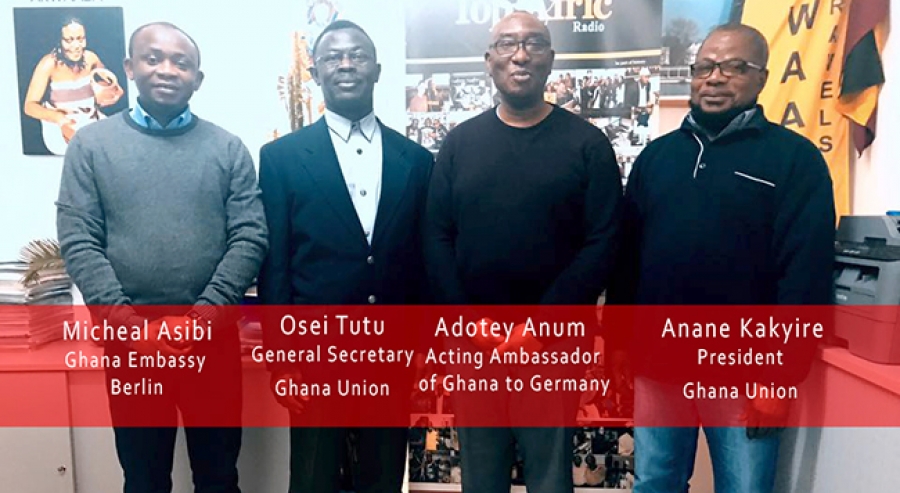About 400 Africans and German sympathisers turned out on Wednesday (8 February) to protest against the police shooting of Augustine Akwasi Obenga in Hamburg a week ago.
The demo started from the central train station and proceeded through the Lampedusa Tent in Steindamm and back to the train station. Protesters spent about three hours in the biting cold to register their protest at what they consider as unjustified and disproportionate use of force by the police.
According to official accounts of the incident, a policeman in plain clothes shot the Ghanaian three times ostensibly in self-defence at about 4 pm on 1 February at Bremer Reihe near the city’s main train station.
The victim, who is said to be drunk at the time, was said to have attacked the German law-enforcement agent with a knife.
The policeman had approached the 33-year-old Ghanaian after he was informed about the victim’s “aggressive behaviour” by two German women.
However, the official accounts have not been corroborated by independent eye-witnesses.
And the Hamburg Police has set up a 3-man commission to probe the shooting.
The victim, who is still in critical condition and under intensive medical care in the hospital, is a member of the Lampedusa Group, a refugee support organisation, in Hamburg. And he’s known to be very active in the African community as well.

Those who know the Ghanaian say it is difficult for them to believe that he would attack a policeman like it’s claimed.
“It’s hard to believe that he had attacked a policeman with a knife,” says Sylvaina Gerlich, who represents Africa on the Hamburg Integration Advisory Board and who knows the victim. “But we should not make a judgement against the police or formulate allegations against the police,” she warned.
“Leading representatives of the community have expressed their concerns to me,” Mrs Gerlich revealed. “We would like to see a cosmopolitan Hamburg in which we feel welcomed as African fellow citizens,” she added.
The incident has thrown up the issue of police violence against people of colour in Germany.
And today’s protest march in Hamburg, with participants carrying placards reading HERE IS NOT AMERICA! STOP SHOOTING US! BLACK LIVES MATTER! re-enacted the Black Lives Matter marches in the United States.
Even though the circumstances of the shooting are not clear yet, protesters say some Hamburg police officers were highly aggressive and uncontrolled in the manner they approach Black Africans.
“There are many reports which prove that the police in Hamburg have developed an aggressive energy of mistreatment and violence against Black Africans at Hafenstraße, St. Georg, Bremer Reihe etc.”, protesters said in a statement.
“We want to remind you of Black Africans like Oury Jalloh, Jaja Diabi and Laya Condé who all died at the hands of a racist German police approach. The brutality and killings of these Black Africans by German police without any legal consequences should not be allowed to encourage Hamburg police to start shooting at Black Africans.”
Meanwhile, the acting Ambassador of Ghana to Germany, Mr Samuel Adotey Anum, has visited Hamburg on the issue.
He met the leaders of the Ghana community on Saturday, 4 February in the office of TopAfric Media Network to ascertain the facts of the case.
Mr Anum advised Ghanaians to be calm and exercise restraint while official investigations are conducted by the German authorities, promising to keep abreast of developments on the issue.
Felix Dappah
 THE AFRICAN COURIER. Reporting Africa and its Diaspora! The African Courier is an international magazine published in Germany to report on Africa and the Diaspora African experience. The first issue of the bimonthly magazine appeared on the newsstands on 15 February 1998. The African Courier is a communication forum for European-African political, economic and cultural exchanges, and a voice for Africa in Europe.
THE AFRICAN COURIER. Reporting Africa and its Diaspora! The African Courier is an international magazine published in Germany to report on Africa and the Diaspora African experience. The first issue of the bimonthly magazine appeared on the newsstands on 15 February 1998. The African Courier is a communication forum for European-African political, economic and cultural exchanges, and a voice for Africa in Europe.





























